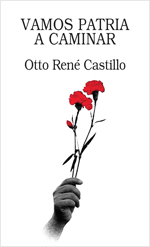Constante Hida / Manuel Tzoc / 2016
My friend brought me back Constante Huida by Manuel Tzoc back from Guatemala this past fall. I've been itching to read their work for years and was so grateful! Tzoc is a monumental queer Maya writer from Guatemala, one of the first voices you’ll have recommended to you when you ask. That said, I’m not sure if this is the collection by which to get to know Tzoc’s work. Most of the collection is a well-crafted irreverent queer ennui diatribe. While Tzoc sprinkles the collection with playful puns and eye-catching images here and there, there are one too many poems bemoaning the challenges of writing for me to understand where all the pomp was coming from. There are definitely glimpses of real pathos on the page, such as “por el día/por los días.” Either way, I’m glad to have read it and will be seeking out more of his work. 2 out 5



